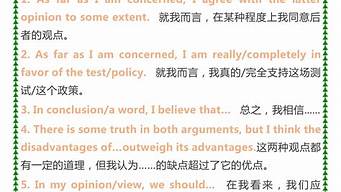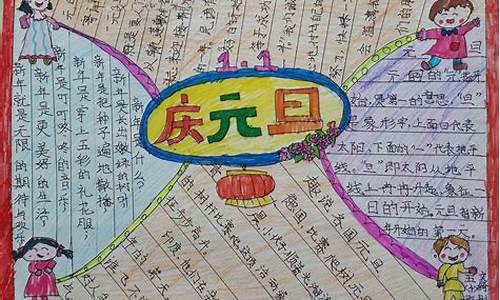您现在的位置是: 首页 > 写作技巧 写作技巧
高考英语必背句子300句_高考英语必背句子300句人教版
zmhk 2024-04-22 人已围观
简介高考英语必背句子300句_高考英语必背句子300句人教版 对于高考英语必背句子300句的问题,我有一些经验和见解,同时也了解到一些专业知识。希望我的回答对您有所帮助。1.高三学生必背英
对于高考英语必背句子300句的问题,我有一些经验和见解,同时也了解到一些专业知识。希望我的回答对您有所帮助。
1.高三学生必背英语经典句子128个
2.英语高考万能句子模板45句
3.高中英语:高考英语常考60个句型+例句
4.英语作文万能句子高中 精选句子大全

高三学生必背英语经典句子128个
高考必背经典英语句子(Season Two)
1.I like it in the autumn when the weather is clear and bright. 我喜欢秋天的天气既清澈又明亮
2.It was with great joy that he received the exciting news. 怀着巨大的喜悦,他收到了这个令人兴奋的消息
3. The weather turned out to be fine. I needn’t have carried my umbrella with me. 结果天气很好,我本不需要带上伞
4. If he had followed my advice, he wouldn't have lost his job. 如果他听了我的建议,他就不会丢掉工作
5. It is what you do rather than what you say that matters. 重要的不是你说什么而是你做什么
6.Only then did she realized how much damage the accident had been caused. 直到那时我才意识到这次事故造成了多么大的破坏
7. If it is quite convenient to you, I will visit you next Tuesday. 方便的话我下周二来拜访你
8. I am more than glad to be able to help you. 能够帮助你我非常开心
9. Several weeks had gone by before I realized the painting was missing. 很多天过去了我才意识到那幅画不见了
10. while I really don’t like art, I find his work impressive. 尽管我不喜欢艺术,我发现他的作品真的令人印象深刻
11.Mr.Zhang gave me a valuable present, one I had never seen before. 张先生给了我一份有价值的礼物,一份我从没见过的礼物
12. The flowers his friend gave him will die unless watered every day. 除非每天浇水,他朋友给他的花会死
英语高考万能句子模板45句
在高考英语中,口语也是很重要的,下面是我为大家整理的关于高考 英语口语 必备100句,希望对您有所帮助。欢迎大家阅读参考学习!高考英语口语必备100句
1. Who is that?你是谁?
2. I see. 我明白了。
3. I quit! 我不干了!
4. Let go! 放手!
5. Me too. 我也是。
6. My god! 天哪!
7. No way! 不行!
8. Come on. 来吧(赶快)
9. Hold on. 等一等。
10. I agree. 我同意。
11. Not bad. 还不错。
12. Not yet. 还没。
13. See you. 再见。
14. Shut up! 闭嘴!
15. So long. 再见。
16. Why not?
好呀!(为什么不呢?)
17. Allow me. 让我来。
18. Be quiet! 安静点!
19. Cheer up! 振作起来!
20. Good job! 做得好!
21. Have fun! 玩得开心!
22. How much? 多少钱?
23. I'm full. 我饱了。
24. I'm home. 我回来了。
25. I'm lost. 我迷路了。
26. My treat. 我请客。
27. So do I. 我也一样。
28. This way. 这边请。
29. After you. 您先。
30. Bless you! 祝福你!
31. Follow me. 跟我来。
32. Forget it! 休想!(算了!)
33. Good luck! 祝好运!
34. I decline! 我拒绝!
35. I promise. 我保证。
36. Of course! 当然了!
37. Slow down! 慢点!
38. Take care! 保重!
39. They hurt.(伤口)疼。
40. Try again. 再试试。
41. Watch out! 当心。
42. What's up? 有什么事吗?
43. Be careful! 注意!
44. Bottoms up! 干杯!
45. Don't move! 不许动!
46. Guess what? 猜猜看?
47. I doubt it 我怀疑。
48. I think so.我也这么想。
49. I'm single. 我是单身贵族。
50. Keep it up! 坚持下去!
51. Let me see.让我想想。
52. Never mind.不要紧。
53. No problem! 没问题!
54. That's all! 就这样!
55. Time is up. 时间快到了。
56. What's new?
有什么新鲜事吗?
57. Count me on 算上我。
58. Don't worry. 别担心。
59. Feel better? 好点了吗?
60. I love you! 我爱你!
61. I'm his fan. 我是他的影迷。
62. Is it yours? 这是你的吗?
63. That's neat. 这很好。
64. Are you sure? 你肯定吗?
65. Do l have to 非做不可吗?
66. He is my age. 他和我同岁。
67. Here you are. 给你。
68. No one knows. 没有人知道。
69. Take it easy. 别紧张。
70. What a pity! 太遗憾了!
71. Anything else? 还要别的吗?
72. To be careful! 一定要小心!
73. Do me a favor?
帮个忙,好吗?
74. Help yourself. 别客气。
75. I'm on a diet. 我在节食。
76. Keep in touch. 保持联络。
77. Time is money.
时间就是金钱。
78. Who's calling? 是哪一位?
79. You did right. 你做得对。
80. You set me up! 你出卖我!
81. Can I help you? 我能帮你吗?
82. Enjoy yourself!
祝你玩得开心!
83. Excuse me, Sir.
先生,对不起。
84. Give me a hand! 帮帮我!
85. How's it going? 怎么样?
86. I have no idea. 我没有头绪。
87. I just made it! 我做到了!
88. I'll see to it 我会留意的。
89. I'm in a hurry! 我在赶时间!
90. It's her field. 这是她的本行。
91. It's up to you. 由你决定。
92. Just wonderful! 简直太棒了!
93. What about you? 你呢?
94. You owe me one.
你欠我一个人情。
95. You're welcome. 不客气。
96. Any day will do. 哪一天都行
97. Are you kidding?
你在开玩笑吧!
98. Congratulations! 祝贺你!
99. I can't help it. 我情不自禁。
100. I don't mean it.
我不是故意的。
高考英语口语必备100句相关 文章 :
★ 英语最实用口语100句
★ 最常用100句英语口语,有了它,再也不怕雅思口语了!
★ 2020高考英语励志格言100句精选
★ 高考英语口语考什么?要怎么复习才高效?
★ 经典高考必备英语句子
★ 关于英语常用句子100句
★ 高考励志语录英语100句
★ 职场英语口语100句经典
★ 小学英语最实用的英语口语100句
★ 关于高考必备英语句子
高中英语:高考英语常考60个句型+例句
相关专题:“英语高考万能句子”。尽管简单,不是所有的人可以得到这样的结论。当今社会现代信息传播的日益便利,我们会使用句子来表达心情,句子可以传递我们的想法。你习惯于收藏哪些句子呢?为此,我花时间整理了英语高考万能句子模板, 不妨参考一下。希望你喜欢!
英语高考万能句子模板(1--23条)1、Love is a fabric that nature wove and fantasy embroidered.爱情是一方织巾,用自然编织,用幻想点缀。
2、现在,网络更容易接近,成了人们获取信息、学习知识和沟通交流的一种重要的途径。 Currently, with more people having easier access to the Internet, it is becoming an important means of acquiring information, learning and keeping in contact with others.
3、She resembles(is like) her sister in appearance but not in character.
4、你将会从这次有价值的经历中获益很多。
5、----We had no choice under such circumstance but to wait to be rescued.
6、改革开放以来,中国发生了翻天覆地的变化。
7、The teacher suggested that we should look through the questions before our moving on to the text. What the teacher advised us to do is that we should first go through the few questions before we read the whole passage.
8、Qian Xuesen, China’s father of space technology, has made a great contribution to China’s space industry.
9、每天照料两个孩子使得她感觉精疲力竭。(care)
10、He quickly adapted / adjusted (himself) to the new environment and new life style, owing to his positive attitude to changing himself.
11、If we do not take action immediately, it will cost our children and grandchildren a lot.
12、Although scenery behind career and family each have malaises, but optimistic she face actively, full of positive energy.
13、毫无疑问, 我们的教育制度不令人满意。
14、Library has been so special a place as it can bring you great ideas as well as all kinds of knowledge.
15、You don’t love a woman because she is beautiful, but she is beautiful because you love her.你不会因为美丽去爱一个女人,但她却会因为你的爱而变得美丽。
16、他似乎是个难以接近的人,但是当别人遇到困难的时候,他总是乐意帮助。
17、Regardless of the conditions, I disagree with your opinion that inflation is beyond our control.
18、他很累,但他仍然工作到深夜。(as)
19、He is starving for==thirsty/ longing/ dying/ eager for college education.
20、If she had been given more time, she would have worked out the math problem.
21、如果你能考取复旦大学的话,你的父母肯定会为你感到骄傲。
22、I couldn’t understand/make sense of what he said.
23、由于双方观点大相径庭,最终没有达成任何协议。(agreement) ----As the two parties hold totally different idea, they didn’t reach any agreement.
英语高考万能句子模板(24--46条)24、那个官员采纳了我的建议,因为他认为这个建议会很成功。
25、尽管简单,不是所有的人可以得到这样的结论。
26、随着社会的不断发展,人们通过不同方式接受教育的机会越来越多。
27、When youre always trying to conform to the norm, you lose your uniqueness, which can be the foundation for your greatness.
28、一个人的童年所经历的一切往往对一生都会产生重大影响。
29、她和她的姐姐在相貌上相似, 但不是在性格上。
30、We had better take (full) advantage of the opportunity to improve ourselves.
31、他动身去上海希望找一份好工作。
32、这次事故怪不得孩子们。(blame)
33、I feel happy at times we have had angry words but these have been kissed away.我们生气争执时,爱的双唇把它们吻得无影无踪,我的心也顿觉甜蜜。 27、First impression of you is most lasting.对你最初的印象,久久难以忘怀。
34、用过多的时间玩网络游戏会大大地损害青少年的身心健康。
35、It was said that medical neglect had resulted in her death.
36、I told him to take an umbrella, just in case of /for fear of rain.
37、His tone suggested / implied his disapproval of our proposal.
38、To the world you may be just one person. To the person you may be the world.对于世界,你可能只是一个人,但对于某个人,你却是整个世界。
39、Her death was said to have resulted from medical neglect.
40、我父母不赞成我学医。
41、他学习刻苦。因此,他轻松地通过了考试。
42、他父亲离开祖国已经50年了,非常想念自己的亲人.
43、中国航天之父钱学森为中国的'航天事业做出了巨大的贡献。
44、It does mean that you will have the conscious awareness to change the negative to a positive and allow that positive energy to shape your life as opposed to being influenced by the negative.
45、我们面临很多困难,其中最主要的困难就是我们没法与外界取得联系。
英语作文万能句子高中 精选句子大全
高中英语:高考英语常考60个句型+例句
高中英语入门超级重要的60个句型,附有例句,不爱记语法理论的同学,一定要多背自己不熟悉的句式。
1. as…as?和……一样
中间必须用形容词或副词原级。例如:
This classroom is as big as that one.
这间教室和那间一样大。
He runs as fast as Tom.?
他和汤姆跑的一样快。
否定结构:not as/so…as,“不如……”。上面的两个句子可分别改为:
This classroom is not as/so large as that one.
这间教室不如那间大。
He doesn’t run as/so fast as Tom.
他跑得不如汤姆快。
2. as soon as 一……就……
用来引导时间状语从句。若主句是一般将来时,从句要用一般现在时。例如:
I’ll tell him the plan as soon as I see him.
我一看到他就告诉他这个计划。
He’ll go home as soon as he finishes his work.
他一完成工作就回家。
3. be busy/enjoy/hate/go on/finish doing sth. 忙于/喜欢/讨厌/继续/完成做某事
在enjoy, finish, hate, go on, be busy等词语后,一般用动词-ing形式作宾语。例如:
Lin Tao is busy making a model plane.
林涛正忙着做飞机模型。
My mother enjoys taking a walk after supper.
我妈妈喜欢晚饭后散步。
I hate watching Channel Five.
我讨厌看五频道。
When someone asked him to have a rest, he just went on working.
当有人让他休息一会儿时,他仍继续工作。
I have finished writing the story.
我已经写完了故事。
4. fill…with 用……装满......;be filled with 充满了……;be full of 充满了......
①be filled with 说明由外界事物造成的此种状态,表示被动。例如:
The box is filled with food.
盒子里装满了食物。
②be full of说明主语处于的状态。此外,还可表示程度,意为“非常”。例如:
The patient’s room is full of flowers.
那个病人的房间摆满了花。
The young man is full of pride.
那个年轻人非常骄傲。
③这两种结构还可以相互改写。例如:
I fill the box with food. The box is full of food.
5. be good/bad for 有利于/有害于……
此句型是:be+adj.+for+n.结构。例如:
Doing morning exercises is good for your health.
做早操对你的健康有益。
Always playing computer games is bad for your study.
总玩电脑游戏对你的学习不利。
6. be used to(doing) sth. 习惯于……
后必须接名词或动名词,可用于现在、过去、将来的多种时态。be 可用get,become来代替。例如:
He is used to life in the country.(He is used to living in the country.)
他习惯于乡村生活。
He will get used to getting up early.
他将会习惯于早起。
注意:be used to do 的意思是“被用来做……”。例如:
Wood is used to make paper.
木材被用来造纸。
7. both…and…两者都……
用来连接两个并列成分;当连接两个并列主语时,其后谓语动词用复数。例如:
Both the students and the teachers will go to the History Museum tomorrow.
不论老师还是学生明天都会去历史博物馆。
8. can’t help doing sth. 禁不住做某事
help在此的意思是“抑制,忍住”,其后接动词-ing形式。例如:
His joke is too funny. We can’t help laughing.
他的笑话太有趣了,我们禁不止笑了起来。
9. sth. costs sb. some money 某物花费某人多少钱
此句型的主语是物。cost一词带的是双宾语,它的过去式、过去分词和原型一样。
This book cost me five yuan.
这本书花了我五元钱。
10. either…or… 不是……就是……,或者……或者……
用来连接两个并列成分,当连接并列主语时,谓语动词与邻近的主语保持一致。
You may either stay here or go home.
你可以呆在这儿,也可以回家。
Either she or I am right. = Either I or she is right.
不是她对就是我对。
11. enough (for sb.) to do sth. 足够……做……
在此结构中,for用来引出不定式的逻辑主语。例如:
The ice isn’t thick enough for you to walk on.
这冰还没有厚到你可以在上面走的程度。
12. feel like doing sth. 想要做……
此处like为介词,后面跟动词-ing形式。此句型与would like to do sth.同义。例如:
I feel like drinking a cup of milk.
我想喝一杯牛奶。
13. feel/find/think it adj./n. to do sth. 认为某事……
在此结构中it为形式宾语,不定式短语作真正的宾语。例如:
I find it very interesting to play football.
我发现踢足球很有趣。
She thinks it her duty to help us.
她认为帮助我们是她的职责。
14. get ready for sth./to do sth.
get ready for sth.意为“为某事做准备”;get ready to do sth.意为“准备做某事”例如:
We are getting ready for the meeting.
我们正在为会议做准备。
They were getting ready to have a sports meet at that moment.
他们那时正准备开运动会。
15. get/receive/have a letter from 收到……的来信,相当于hear from
Did you receive a letter from John?
你收到约翰的来信了吗?
I got a letter from my brother yesterday.
我昨天收到了我弟弟的一封来信。
16. had better (not) do sth. 最好(别)做某事
had better为情态动词,其后需用动词原形。had better常用缩写,变成’d better,其否定形式是在其后直接加not。例如:
We had better go now. = We’d better go now.
我们最好现在走吧。
You’d better not go out because it is windy.
今天刮风,你最好别出去了。
17. have sth. done 使(某事)完成 (动作由别人完成)
sth.为宾语,done为过去分词作补语。例如:
We had the machine repaired.
我们请人把机器修好了。
注意区分:We have repaired the machine. 我们(自己)已经修好了机器。
18. help sb. (to) do sth./with sth. 帮助某人(做)某事,其中的to可以省略。例如:
I often help my mother with housework.
我常常帮助妈妈做家务。
Would you please help me (to) look up these words?
请你帮助我查查这些词好吗?
19. How do you like……? 你认为……怎么样?与what do you think of …?同义。例如:
How do you like the weather in Beijing?
你认为北京的天气怎么样? 你觉得这部新**如何?
20. I don’t think/believe that… 我认我/相信……不……
其中的not是对宾语从句进行否定而不是对主句否定(否定前移)。that可省略。例如:
I don’t think it will rain.
我认为天不会下雨。
I don’t believe the girl will come.
我相信那女孩不会来了。
21. It happens that… 碰巧…… 相当于happen to do,例如:
It happened that I heard their secret.
可改写为:I happened to hear their secret
我碰巧听到了他们的秘密。
22. It’s/has been +一段时间+since从句 自从某时起做某件事情已经一段时间了
该句型中since引导的时间状语从句常用一般过去时。例如:
It’s twenty years since he came here.
他来这里已经20年了。
It has been six years since he married Mary.
他和玛丽结婚已经六年了。
23. It is +adj./n. + for sb. to do sth. 做某事对某人来说……
It是形式主语,真正的主语是不定式to do sth。例如:
It’s not easy for us to study English well.
对我们来说学好英语并不容易。
It’s a good idea for us to travel to the south.
去南方旅行对我们来说是个好主意。
24. It’s + adj. + of sb. to do sth.
It是形式主语,to do sth.是真正的主语, 当表语(即形容词)能对逻辑主语描述时,常用介词of,而不用for。例如:
It’s very polite of you to give your seat to old people.
你给老人让座,非常有礼貌。
25. It seems/appears (to sb) that… (在某人看来)好像……
此句中的it是主语,that引导的是表语从句。例如:
It seems that he is lying.?
看样子他好像是在撒谎。
It appears to me that he never smiles.?
在我看来,他从来没有笑过。
26. It is +数词+metres/kilometers long/wide… ……是多少米(公里)长(宽)
用来表示物体的长(宽,高),如数词大于一,名词要用复数。例如:
It is 20 metres long from this end to that end.?
从这端到那端有二十米长。
27. It’s time for sb. to do sth. 是某人干某事的时候了
it是形式主语,真正的主语是动词不定式to do sth. 例如:
It’s time for the child to go to bed.
孩子该睡觉了。
比较下面两种结构:
① It’s time for + n. 例如:
It’s time for school.
②It’s time to do sth. 例如:
It’s time to go to school.
28. It takes sb. some time to do sth. 花费某人多少时间做某事
it是形式主语,真正的主语是动词不定式to do sth。例如:
It takes her fifteen minutes to walk to the bus stop from here.
从这儿走着到公交车站将花费她15分钟。
It took the old man three days to finish the work.
那个老人花了三天时间完成这项工作。
29. keep (on) doing sth. 一直坚持做某事
keep doing sth.一般用于静态动词。keep on doing sth.意为“继续不停地做某事”,一般用于动态动词,但二者的区别并不是很严格,有时可以互换。例如:
Don’t keep on doing such foolish things.
不要再做这样的傻事了。
He kept sitting there all day.
他整天坐在那里。
30. keep…from doing sth. 阻止......做某事
相当于stop…from doing sth., prevent…from doing sth. 在主动句中,stop和prevent后面的from可以省略,但在被动结构中,from不可以省略。例如:
Please keep the children from swimming in the sea.
请别让孩子到海里游泳。
The big noise outside my room stopped me from doing my homework.
屋外巨大的噪音使我不能做作业。
31. keep sb. doing sth. 让某人一直做某事
不可和keep sb.from doing sth.结构混淆。例如:
Why do you keep me waiting for a long time?
你为什么让我等了很长时间?
32. make sb. do sth. 使某人干某事
make意为“使”时,其后要有不带to的动词不定式。例如:
He made me work ten hours a day.?
他让我每天工作10小时。
注意:上句如改为被动语态,则work 前的to不能省略。例如:
I was made to work ten hours a day.
33. neither…nor… 既不……也不……
当连接两个并列主语时,谓语动词与邻近的主语取得一致(就进一致原则)。例如:
Neither we nor Jack knows him.?
我们和杰克都不认识他。
He neither knows nor cares what happened.?
他对发生的事情不闻不问。
34. not…until… 直到……才......
until后可跟名词或从句,表示时间。例如:
He didn’t come until late in the evening.
他直到晚上很迟才来。
He didn’t arrive until the game began.?
直到比赛开始他才来。
35. sb. pays money for sth. 某人花钱买某物
此句型主语是人。例如:
I’ve already paid 2,000 yuan for the motor bike.?
我已经花了2000元买这辆摩托车。
36. spend time/money on sth./(in)doing sth. 花费(时间、钱)在某事上/做某事
其中in可以省略,通常主语为“人”。例如:
I spent five yuan on this book.?
我在这本书上花了五元钱。
I spent two hours (in) doing my homework yesterday.
昨晚我花了两个小时做作业。
37. so…that… 太……以至于……
用于复合句,that引导的是结果状语从句。so是副词,后面应接形容词或副词,如果接名词,应用such。例如:
The ice is so thin that you can’t walk on it.?
冰太薄了,你不能在上面走。
He is such a kind man that we all like him.?
他是一个非常好的人,我们都很喜欢他。
38. stop to do sth., stop doing sth.
stop to do sth. 意为“停下来去做另一件事”,stop doing sth.意为“停止正在做的事”例如:
You’re too tired. You’d better stop to have a rest.?
你们太累了,最好停下来休息一会儿。
The teacher is coming. Let’s stop talking.?
老师来了,咱们别说话了。
39. Thank you for doing sth. 感激你做了……
for之后除了加动名词doing外,还可以加名词。例如:
Thank you for giving me the present.?
谢谢你给我的礼物。
Thank you for your help. =Thank you for helping me.
谢谢你的帮助。
40. thanks to 多亏……,由于……
thanks后的s不能省略,to是介词。例如:
Thanks to my friend Jim, I’ve worked out this problem.?
多亏了我朋友吉姆的帮助,我已经解决了这个问题。
41. There be句型
①在此结构中,there是引导词,在句中不能充当任何成分,也不必翻译出来。句中的主语是某人或某物,谓语动词be要与主语的数保持一致。例如:
There is a man at the door.?
门口有一个人。
当主语是由两个或者两者以上的名词充当时,谓语动词be要跟它邻近的那个名词的数一致(就近一致)。例如:
There are two dogs and a cat under the table.
桌下有两只狗和一只猫。
比较:There is a cat and two dogs under the table.
②There be 句型中的be不能用have来代替,但可以用lie(位于,躺),stand(矗立),exist(生存),live(生活)等词来替换。例如:
There stand a lot of tall buildings on both sides of the street.?
街道两旁矗立着许多高楼。
There lies lake in front of our school.
我们学校前面有一个湖。
Once there lived a king here.?
这儿曾经有一个国王。
There is going to be a sports meeting next week.?
下周准备开一个运动会。
there be 的拓展结构:there seem(s)/happen(s) to be…
There seems to be one mistake in spelling.
似乎有一处拼写错误。
There happened to be a ruler here.?
这儿碰巧有把尺子。
There seemed to be a lot of people there.?
那儿似乎有很多人。
42. The + adj.比较级, the + adj.比较级 越……,越……
此句型表示一方随另一方的变化而变化。例如:
The harder he works, the happier he feels.
他工作越努力,就感到越幸福。
The more, the better.?
多多益善。
43. too+adj./adv. +to do sth. 太……以至于不能…….
此句型为简单句,后面的to表示否定含义。例如:
The ice is too thin for you to walk on.?
这冰太薄,你不能在上面走。
The bag is too heavy to carry.?
这个袋子太重搬不动。
44. used to do sth. 过去常常做某事
used to是情态动词,表示过去的习惯动作或状态,现在已不存在,因此只用于过去时态。例如:
He used to get up early.?
他过去总早起。
When I was yong, I used to play tennis very often.?
我年轻时经常打网球。
否定形式有两种:didn’t use to;used not to,例如:
He didn’t use to come. = He usedn’t to come.?
他过去不常来。
45. what about…? ……怎么样?
后面可接名词、代词、动名词等。与“how about…?”同义。例如:
We have been to Hainan. What about you?
我们去过海南,你呢?
What about going to the park on Sunday?
星期天去公园怎么样?
46. What day/date is it today? 今天星期几(几月几日)?
—What day is it today?
—Sunday.
—What date is it today?
—June 24th.
47. What’s wrong (the matter) with…? ……怎么了?
What’s wrong with you, Madam?
夫人,您怎么了?
You look worried. What’s wrong with you?
你看上去很焦急,出什么事了?
48. Why not do…? 为什么不做……?
谓语动词用原形。与Why don’t you do…?同义。例如:
Why not go to see the film with us?= Why don’t you go to see the film with us?
为什么不和我们一起去看**呢?
49. would like to do sth. 想做……
后用动词不定式作宾语。例如:
I would like to drink a cup of tea.
我想喝一杯茶。
疑问句式:Would you like (to drink) a cup of tea?
你想喝杯茶吗?
50. adj./adv.比较级 + and adj./adv.比较级 越来越......
若形容词/副词为双音节词及多音节词,则这一结构变为“more and more +形容词/副词”。例如:
It’s getting warmer and warmer.?
天气变得越来越暖和了。
The little girl becomes more and more beautiful.?
小女孩变得越来越漂亮了。
51. adj.比较级+than
than引导的是典型的比较级句型,表示“一者比另一者……”,其前用形容词或副词的比较级,than从句可以用省略形式。例如:
I know you better than she does.?
我比她更了解你。
This house is bigger than that one.?
这所房子比那所房子大。
52. though-从句
though引导的是让步状语从句,意思是“虽然……但是……”。但不能和but连用,英语中表达“虽然……,但是……”时,though和but只能用一个。例如:
Though it was snowing, it was not very cold.?
虽然下着雪,可并不太冷。
I was late for the last bus though I hurried.?
虽然我拼命赶路,还是没搭上最后一班公交车。
We didn’t feel tired though we walked a long way.?
虽然我们走了很长的路程,但是并没有感到累。
53. if-从句
If 引导的是条件状语从句,“如果;假如“。如主句用一般将来时,if从句要用一般现在时(主将从现)。例如:
If I go to the Great Wall tomorrow, would you like to come along?
如果明天我去长城,你会和我一起去吗?
If it rains tomorrow, I won’t go.?
如果明天下雨,我就不去了。
54. because-从句
引导原因状语从句,“因为”。例如:
He didn’t hear the knocking at the door because he was listening to the radio.?
他没有听见敲门声,因为他正在听收音机。
55. so + do/be + 主语
“So + be/助动词/情态动词 + 主语” 表示前面所述内容也适用于另一人或物。be、助动词或情态动词的选择视前面陈述句中谓语动词的时态形式而定。例如:
He likes football and so do I.?
他喜欢足球,我也如此。
Jim was playing football just now and so was Tom.?
刚才吉姆在踢足球,汤姆也在踢足球。
比较:“So +主语+be/助动词/情态动词.”结构,是用来证实前一句所表达的内容(起强调作用)。be、助动词或情态动词的选择视前面陈述句中谓语动词的时态形式而定。
A: It is very hot today. 今天天气很热。
B: So it is. 确实如此。
56. not only…but also… 不但……而且……
常用来连接语法作用相同的词、短语或句子。连接两个主语时,谓语动词要和紧靠它的主语在人称和数上保持一致。例如:
She likes not only singing but also dancing.?
她不但喜欢唱歌,而且喜欢跳舞。
He is not only a good doctor but also a good father.?
他不但是个好医生而且是个好爸爸。
Not only I but also he is hoping to go there.?
不但我而且他也想去那儿。
57. prefer…to… 喜欢……胜过…...
prefer (doing) sth. to (doing) sth. 意为“两者相比更喜欢(做)其中之一”。在此结构中,to是介词,接名词或动名词,结构中前后所跟成分一样。例如:
He prefers tea to coffee.?
茶与咖啡相比,他更喜欢茶。
He prefers doing shopping to going fishing.
购物与钓鱼相比,他更喜欢购物。
58. 感叹句型:What (a/an) + adj. + n. +主语+谓语! How + adj./adv.+ +主语+谓语!
What a clever boy (he is)! =How clever the boy is!?
这个男孩儿多聪明啊!
What a wonderful film we saw last night!?
昨天晚上我们看的**多精彩啊!
How lovely the weather is!?
天气多好啊!
How hard he works!?
他工作多么努力啊!
59. 祈使句型
祈使句型表示命令、请求、劝告等含义。说话的对象通常为第二人称,习惯上常省略。句末用句号或感叹号。肯定祈使句是:谓语动词用动词原形表示。否定祈使句是:在谓语动词前加do not(don’t)。例如:
Be here on time tomorrow.?
明天准时到这儿来。
Say it in English!
用英语说!
Don’t be afraid!
别怕!
Don’t look out of the window!
不要朝窗外看!
60. 并列句型
用并列连词连接起来的两个或两个以上的简单句叫并列句。连接并列句常用的连接词有:and, but, or, so, however, not only…but also, neither…nor, either…or…等。例如:
I help her and she helps me.
我帮助她,她帮助我。
He is very old but he is in good health.
他年纪很大了,但他身体很好。
We must hurry, or we’ll be late.
我们得赶快走,不然就晚了。
Kate does her work carefully, so she never makes any mistakes.
凯特工作很认真,从不出错。
作文题更在于平时的积累,因为写作文会用到大量的单词以及固定短语,这需要我们在平时学习的过程中就注意积累作文常用表达的收藏与运用,在考试时我们可以直接搬过来使用,会节省很多时间也会让自己的作文看起来更加连贯精彩。英语作文万能句子
1.I will conclude by saying...最后我要说…
2.Therefore, we have the reason to believe that...因此,我们有理由相信…
3.All things considered,总而言之 It may be safely said that...它可以有把握地说......
4.Therefore, in my opinion, it's more advisable...因此,在我看来,更可取的是…
5.From what has been discussed above, we may safely draw the conclusion that….通过以上讨论,我们可以得出结论…
6.The data/statistics/figures lead us to the conclusion that….通过数据我们得到的结论是,....
7.It can be concluded from the discussion that...从中我们可以得出这样的结论
8.From my point of view, it would be better if...在我看来……也许更好
英语作文必背好句1.A case in point is ... 一个典型的例子是...
2.As is often the case...由于通常情况下...
3.As stated in the previous paragraph 如前段所述
4.But the problem is not so simple. Therefore 然而问题并非如此简单,所以……
5.But it's a pity that... 但遗憾的是…
6.For all that...对于这一切...... In spite of the fact that...尽管事实......
7.Further, we hold opinion that... 此外,我们坚持认为,...
8.However , the difficulty lies in...然而,困难在于…
9.Similarly, we should pay attention to... 同样,我们要注意...
10.not(that)...but(that)...不是,而是
今天关于“高考英语必背句子300句”的探讨就到这里了。希望大家能够更深入地了解“高考英语必背句子300句”,并从我的答案中找到一些灵感。









